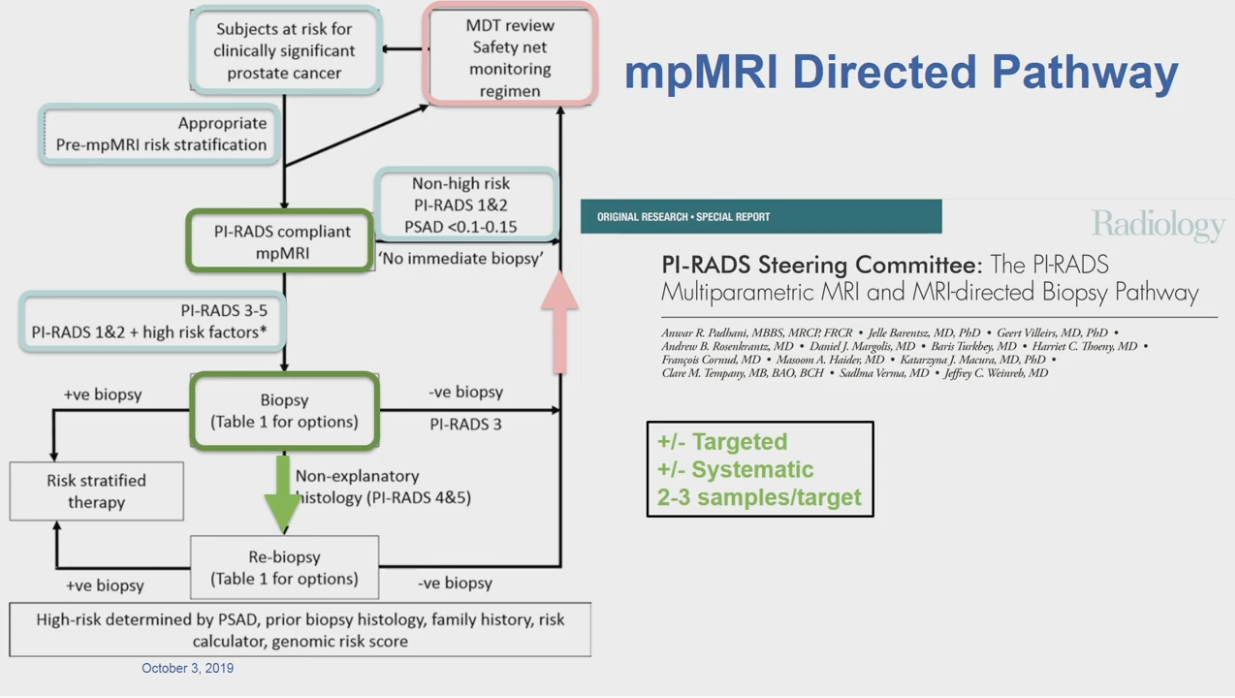Masoom Haider, MD, presented “Multi-Parametric MRI” during the 4th Global Summit on Precision Diagnosis and Treatment of Prostate Cancer on October 3, 2019 in Boston, Massachusetts.
How to cite: Haider, Masoom. “Multi-Parametric MRI” October 3, 2019. Accessed Jul 2025. https://grandroundsinurology.com/multi-parametric-mri/
Multi-Parametric MRI – Summary:
Masoom Haider, MD, provides an overview of the current state of multiparametric MRI, especially in the setting of biopsy-naive patients with elevated PSA levels. He then describes an MRI-directed biopsy pathway and how to integrate it into prostate cancer care.
Abstract:
Three multicenter trials published in 2018, PRECISION, 4M, and MRI-FIRST, generally concluded that the primary values of MRI in the setting of biopsy-naive patients with elevated PSA levels are the potential of biopsy avoidance, the reduction in the detection of clinically insignificant cancer, and the reduction of cores taken per patient. However, the data also show that MRI misses clinically significant cancers in some subpopulations. Therefore, patients who are avoiding biopsy because of a negative MRI need systematic surveillance to ensure significant cancers are not going undetected.
The Prostate Imaging Reporting and Data System (PI-RADS) Steering Committee recently put forth a paper in Radiology detailing an MRI-directed biopsy pathway and how to integrate it into the current framework of prostate cancer care. This presentation reviews key steps in this pathway, from risk-profiling patients to safeguarding steps to take when a patient has a negative MRI, biopsy, or re-biopsy.
In the future, reducing human operator and observer variability in MRI interpretation, MRI-targeted biopsy skills, and Gleason scoring through machine learning and artificial intelligence could improve precision in risk-stratification.
About The 4th Global Summit on Precision Diagnosis and Treatment of Prostate Cancer:
The Global Summit on Precision Diagnosis and Treatment of Prostate Cancer is a multi-day, multi-disciplinary forum designated to inform health care stakeholders about topics including in-vitro fluid- and tissue-based molecular diagnostics, novel observation strategies such as active surveillance, and novel therapeutic interventions. Along with this forum’s efforts to form a consensus on the future of prostate diagnostics and precision care, it aims to create an educational and research strategy for its realization. Dr. Haider presented this lecture during the 4th iteration of this summit in 2019.
ABOUT THE AUTHOR
Masoom Haider, MD, is a Professor of Medical Imaging at the University of Toronto in Ontario. He received his MD from the University of Ottawa and undertook additional training at the University of Toronto and the Cleveland Clinic Foundation. Dr. Haider focuses on prostate cancer localization with MRI using multiparametric approaches; radiologic pathologic correlation in prostate cancer, GU malignancies, and other abdominal and pelvic malignancies; and feature analysis of tumors for imaging biomarker validation and therapy response assessment. He has worked on establishing guidelines for the use of mpMRI for prostate cancer, including the PI-RADS standard for performance and interpretation of prostate mpMRI. Dr. Haider holds three patents on medical imaging technologies and has over 180 publications in peer-reviewed journals.

